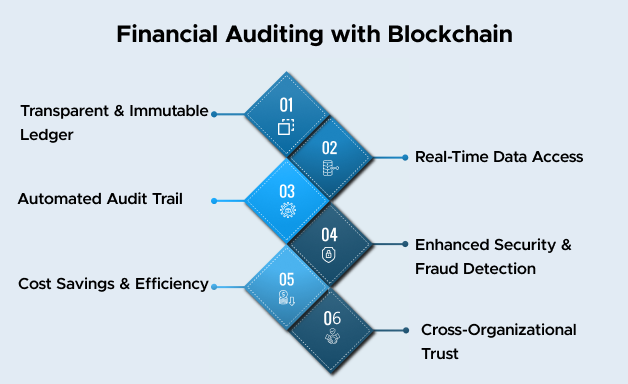Blockchain technology has emerged as a transformative force across various industries, and the world of finance is no exception. One area where blockchain is making significant inroads is in the field of financial auditing. Traditional auditing processes have often been time-consuming, resource-intensive, and susceptible to human errors. However, with the rise of blockchain development services, financial auditing is undergoing a paradigm shift towards increased transparency, efficiency, and security.
In this article, we will explore the key benefits and applications of financial auditing with blockchain and how this innovative technology, in collaboration with a reputable blockchain development company, is reshaping the auditing landscape.
What is Financial Auditing
Financial auditing is the process of examining and verifying an organization’s financial records, transactions, and statements. It is a crucial process that ensures the accuracy, reliability, and compliance of an organization’s financial records and statements.
Qualified auditors meticulously examine financial statements, such as balance sheets, income statements, and cash flow statements, along with supporting documentation. The aim of their assessment is to determine if the financial statements accurately depict the financial status and operational outcomes of the organisation.
Testing internal controls, examining financial transactions, and confirming account balances are just a few of the techniques auditors use to assess the whole financial reporting process. The resulting auditor’s report provides an opinion on the fairness of the financial statements, contributing to transparency and accountability in financial reporting.
Suggested Read | Smart Contract Audit for Secure and Accurate Smart Contracts
Financial Auditing with Blockchain
Financial auditing with blockchain can change the traditional auditing process. Distributed ledger technology can bring more transparency, efficiency, and security to financial auditing. Here is how businesses can utilize blockchain in financial auditing:

Transparent and Immutable Ledger
Blockchain’s decentralized nature securely records all financial transactions in a tamper-proof manner. Auditors can access a transparent and immutable audit trail. It enhances the integrity and reliability of financial data.
Real-time Access to Financial Data
Traditional auditing involves periodic reviews of financial records, often leading to delays in identifying potential issues. Blockchain immediately and continuously updates its network’s financial data. This real-time auditing feature enables auditors to continuously keep an eye on financial activity.
It enables early detection of anomalies, fraud, or non-compliance. As a result, organizations can promptly address any issues and proactively make data-driven decisions.
You May Also Like | Streamlining Financial Netting With Blockchain
Automated Audit Trail
Blockchain’s automated audit trail simplifies the tracking of financial transactions from inception to completion. Blockchain time-stamp and record every action taken on the blockchain to create a comprehensive and auditable history. Auditors can easily trace the origin of funds, follow the flow of assets, and verify the integrity of each transaction.
Enhanced Data Security
Cryptographic methods used in blockchain technology guarantee the integrity and security of financial data. Blockchain uses sophisticated mathematical techniques to encrypt transactions and connect them to earlier transactions.
This cryptographic security makes it extremely challenging for unauthorized parties to tamper with the data. Thus, it safeguards financial information from malicious attacks and data breaches.
Additionally, blockchain’s permissioned access feature allows organizations to control who can view and access sensitive financial information. It ensures data privacy and compliance with data protection regulations.
Also, Check | NFT and DeFi Solutions | Disrupting the Financial Space
Improved Fraud Detection
Blockchain’s transparent nature allows auditors to easily identify potential fraudulent activities and discrepancies in financial transactions. With every transaction recorded on a decentralized, tamper-proof ledger, auditors can trace the movement of assets and verify the accuracy and authenticity of financial data. This heightened level of transparency and accountability can help prevent fraud, reduce errors, and improve overall financial reporting.
Streamlined Reconciliation
Blockchain technology employs a decentralized and shared ledger system that eliminates the need for data reconciliation among multiple parties. This process leads to enhanced efficiency in the reconciliation process while simultaneously decreasing the likelihood of errors.
Efficient Data Sharing
The application of blockchain technology presents a highly secure and controlled approach to data sharing between multiple parties. This approach facilitates seamless and efficient cooperation among auditors, clients, and other pertinent stakeholders, with the assurance of authorized access to shared information.
Check It Out | Metaverse Impact on Financial Services
Simplified Compliance Reporting
Auditors can rely on the data stored on the blockchain for accurate and efficient compliance reporting. It reduces the administrative burden of regulatory audits.
Cost Savings
Financial auditing with blockchain can significantly reduce the cost associated with traditional audits. The decentralized nature of blockchain eliminates the need for intermediaries, simplifies reconciliation processes, and minimizes paperwork.
Auditors can access all relevant data from a single source, streamlining the auditing workflow and reducing administrative burdens. As a result, organizations can allocate resources more efficiently and direct their focus toward strategic initiatives.
Explore More | Satoshi Nakamoto’s Last Email Reveals Bitcoin Creator’s Thoughts
Cross-Organizational Auditing
Cross-organizational auditing refers to the process of auditing financial transactions and records that involve multiple organizations or entities. In such cases, blockchain allows auditors to access a shared ledger. It simplifies cross-organizational auditing and ensures data consistency.
Increased Trust and Accountability
The transparency and immutability of blockchain enhance trust among auditors, clients, and stakeholders. It promotes greater accountability in the auditing process.
Smart Contracts for Automated Auditing
Smart contracts, self-executing code on the blockchain, can automate certain auditing processes. These contracts can trigger predefined actions based on specific events, ensuring greater accuracy and efficiency in the auditing process.
Also, Discover | Use Case: Simplifying Financial Post-Trade Processing with Blockchain
Conclusion
The use of blockchain technology in financial auditing promotes trust and accountability by providing a transparent, tamper-proof, and auditable record of financial transactions. The increased confidence between auditors and clients fosters more productive cooperation. All parties involved eventually gain from it since it results in an auditing process that is more trustworthy and legitimate.
Connect with our blockchain developers to integrate the technology into your business